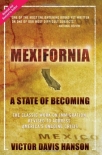Mexifornia: A State of Becoming, Victor Hanson [cool books to read .txt] 📗

- Author: Victor Hanson
Book online «Mexifornia: A State of Becoming, Victor Hanson [cool books to read .txt] 📗». Author Victor Hanson
California has always been a great, though risky experiment in a truly multiracial society, united by a common language, culture and law - something not seen since the creation of the Roman Principate, in which Pax Romana was to give - or else! - the Gaul, the Spaniard and the Thracian alike the Italian notions of government, water via aqueduct, Juvenal's Satires and habeas corpus. But that subjugation of race to culture is forever a fragile state, not a natural condition. Each day it erodes if not actively maintained. Race, chauvinism, ethnicity creep hourly back into social life if not battled by citizens of strength and vision. A few malicious people can undo the work of centuries. Thus, each time a university president, a small-time politician on the make, or a bien pensant liberal journalist chooses the easy path of separatism, he does a little part in turning us toward Rwanda or Yugoslavia. The work of cultural unity is of the ages; advancing racial and ethnic separatism is a gesture of the moment.
How, then, can we recreate civic education to help unite an increasingly fragmented society, and to bring Hispanics and other recent arrivals into the body politic of the United States? It will not be easy - if only because millions of Americans in education, the arts and government have invested a great deal in, and profited handsomely from, a relativist and multicultural society that rejects any unifying core. Their dream is vastly different from the multiracial society in which millions of Americans with a broad spectrum of skin colors speak the same English, share the same commitment to the values of the Constitution, and gradually become indistinguishable through integration, assimilation and intermarriage. Returning to a multiracial society under the aegis of Western culture would put a lot of people in the universities, politics and government bureaucracies quite literally out of business.
What, then, can we do? We must reject the new cultural relativism, situational ethics and arrogant utopianism that have escaped from the university and circulate like an airborne toxin in the popular culture. Scholars must stop teaching nonsense like the idea that Harriet Tubman and Sojourner Truth, important though they were, affected American history more profoundly than John Adams or Alexander Hamilton, or that gangsta rap is essentially no less musical than Beethoven. Rather than blame the United States for persistent imperfection, our educators should emphasize how far we have come in eradicating sins that seem intractable to much of humankind elsewhere.
Just as importantly, we should acknowledge that the new vocationalism of the Right is as pernicious as the multiculturalism of the Left. If students are taught that the main purpose of education is to impart lucrative skills - profitable business acumen or accounting expertise - and that the accompanying good life will itself constitute the Good Life, it will be impossible to mold a generation that will welcome sacrifice or develop any common concern about the well-being of the less fortunate.
Rarely do our students ever learn anything about the great American Captains - Washington, Winfield Scott, Sherman, Grant, Pershing, Patton, Bradley, Doolittle - either because of a general dogma that war is always evil and unnecessary, or simply because of the military ignorance of their teachers. Yet no society can long survive if it cannot produce men of war who emerge in its darkest hours to defend, without subverting, its most cherished values. Caesar Chavez and Susan B. Anthony - whose names all of today's grade-school students seem to recognize - may have been great reformers, but there simply would not have been anything to reform if not for people such as Grant, Sherman and Patton, whose genius and achievements are part of our youth's vast historical illiteracy.
My own elementary school is still two miles away, but whereas forty years ago it turned out skilled and confident Americans, its graduates who enter high school now have among the lowest literacy levels and the most dismal math skills in the state. The lucky ones who eventually go on to college are likely to be among the 47 percent of students entering the California State University system who need remedial classes - the largest university in the world, and nearly half the freshmen take high-school, not college, courses.
Yet for Hispanics, just reaching the remedial CSU programs is a great achievement in itself. Despite millions in federal and state expenditures in the last twenty years, by 1996 only 61 percent of Hispanics - both native and foreign-born - had graduated from high school. Nearly a decade later, out of every 100 Hispanics - native or foreign-born, illegal or lawful immigrants, citizens or aliens - who now enter California high schools, 30 will drop out. And of the remaining 70, fewer than 4 will matriculate prepared for any serious college-level courses in mathematics. Less than 10 percent of all adult Mexican-Americans currently hold a bachelor's degree.
Some may argue over the data, wondering precisely who are those listed as "Hispanic" on surveys and by what chronological parameters a failure to graduate is measured. And new data in the twenty-first century may shed a different light on all this. But what





Comments (0)